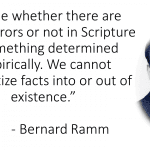Here is some more of my conversation with a colleague about inerrancy:
COLLEAGUE
Thoughts on Frame’s points under the criticisms section?
https://www.thegospelcoalition.org/blogs/justin-taylor/an-interview-with-john-frame-on-apologetics-to-the-glory-of-god/
JAMES
I think the problem is that there is still the assumption that not only is there an ultimate authority, but also the assumption that the human being engaging in the circular argument has grasped the meaning and will of that authority so perfectly that none of the uncertainty that comes with being human needs to temper the conversation.
Isn’t this just foundationalism in another form, except that instead of trying to build everything on the certainty of one’s own existence as per Descartes, the attempt is to start with not merely God but “the God of Scripture” which means not the God of whom the biblical authors wrote as human beings, but a God presumed (in a manner that is shielded from all critical examination) to be described in Scripture with sufficient precision through a process overseen by the divine hand so as to ensure that, once again, any limitations of human comprehension or language are negated.
I can understand the appeal of wanting to simply step into that circle. It is very reassuring. But it still seems to me to result from a human desire to avoid humbly accepting the fallibility of human reason, thought, and comprehension.
Those are my thoughts on the “criticisms” section, very briefly. I look forward to talking more about this!
James
COLLEAGUE
I think your response continues to demonstrate the difference between us. Here you have questioned whether or not there is an ultimate authority, it seems, while I believe that there is an ultimate authority, that we can know that with certainty, and that we can understand the Bible enough to grasp the meaning and will of God—though perhaps not “perfectly,” as you suggest, but with a high degree of certainty.
You suggest that this (I assume by “this” you might be referring to presuppositionalism?) is just another form of foundationalism built on the certainty of “the God of Scripture” (as opposed to just God). I suppose that is correct, and it seems like you’re working to discredit the authority and inspiration of the Bible.
I find it ironic, I suppose, that you think we should “humbly [accept] the fallibility of human reason, thought, and comprehension” while asserting your ability to determine that the Bible isn’t authoritative and what it does or doesn’t say. Is it not possible that your inherent fallibility precludes you from submitting to the authority of God’s Word? You seem certain that uncertainty should be the hallmark of one’s epistemology. Do you think Isaiah 5:21 has anything to say about this?
Frame writes, “In Christian epistemology, God’s word is the ultimate criterion of certainty. What God says must be true… So God’s word is the criterion by which we can measure all other sources of knowledge… Our certainty of the truth of God comes ultimately, not through rational demonstration or empirical verification, useful as these may often be, but from the authority of God’s own word.” (https://frame-poythress.org/certainty/)
JAMES
The conversation will continue next time…













